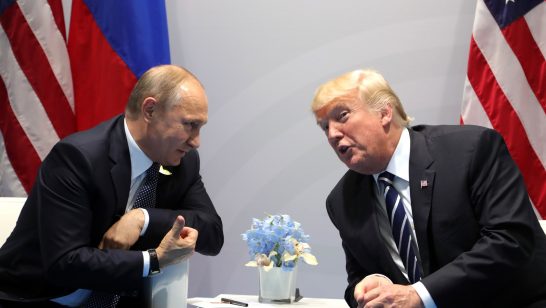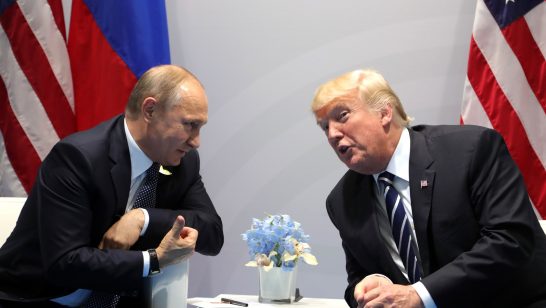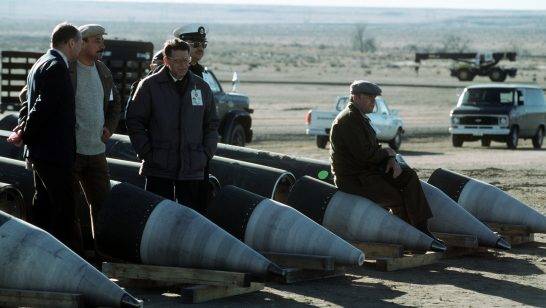
As President Trump announced on 21 October, the United States intends to terminate the INF Treaty. The justification for the walkout is first that Russia is fielding a non-compliant ground-launched cruise missile (GLCM) and second that it remains bound by the terms of the agreement whilst China is free to build INF-class systems.
The collapse of the INF would not only be a sharp break from previous US arms control policy but would challenge the remaining nuclear arms control framework in its entirety. After exiting the Paris Agreement on Climate Change and the Iran Nuclear Deal, President Trump’s announcement shows the disrespect of the current administration for the rule-based international order. Moreover, it undermines the US’s leadership, reliability, and credibility on arms control issues.
European NATO allies were not consulted on this unilateral move; NATO had stated it remained “fully committed to the preservation of this landmark arms control treaty”. President Trump came to a contrary conclusion, and US action has resulted in an undermining of the alliance’s cohesion. It is clear that should the INF Treaty collapse, European countries would be the recipients of Russian response, so how should Europe react?
Three main questions are key:
Are the facts grave enough for withdrawing from the INF treaty?
The US announcement is not based on a published display of facts. Supporters of the withdrawal argue that Russians are cheating on the terms of the agreement. This may be true, however, US assessments are classified and the public has no insight into the accusations. If the public reaction during the Euromissile crisis in the 1980s and the Iraqi invasion is any guide, this absence of evidence risks triggering a growth in anti-Americanism or protest. President Trump may not care about this, but European governments should.
Simply repeating that Russia is cheating is unconvincing when not backed by evidence. The US assertion that Russia is violating INF by testing a prohibited GLCM (known as 9M729) may indeed be plausible, but it remains to-date unproven. Russia has denied all such allegations and responded in kind with its own counter-accusations.
It is clear the US and Russia have not shown political will in seeking a compromise to solve the crisis. American and Russian experts have discussed specific proposals such as data exchanges, weapon demonstrations, and visits during Track II meetings: Their respective governments have not.
Unfortunately, Russia has never made a convincing statement about the purpose and the parameters of the 9M729 missile either. The US asserts that the range of this missile exceeds the INF limit of 500 km; Russia insists it has never tested the GLCM to the prohibited the INF range. It is not trivial to determine the range of a cruise missile as it technically can have different flight profiles. Yet exiting the treaty before detailed and serious talks between US and Russian experts on resolving these issues can take place is premature.
Additionally, it is important to understand the military aspect of the two alleged fielded Russian 9M729 battalions. A total of eight launchers would have been deployed: a small and strategically insignificant number. Both Russia and the US possess many more sea- and air-launched INF-range missiles potentially equipped with nuclear weapons. If the addressee of this deployment is China, which has around 100 medium-range land-based ballistic missiles (DF15/DF-21/DF-26), it would be more productive to address this directly by working on an arms control and transparency regime in Asia.
Has the US made a sober analysis of the consequences?
The US move could trigger a new arms race involving ground-based nuclear, conventional ballistic, or cruise missiles with short flight times, undermining crisis stability in Europe. Scrapping the treaty would also allow Russia to expand its limited and militarily not yet very substantial ground-based missile arsenal. It would encourage other countries to invest more in INF-class systems. A new offensive arms race could also lead to investments in precision-guided conventional strategic systems, space and cyber weapons, and create incentives for new missile defence deployments. As already mentioned, the withdrawal from the INF also undermines NATO´s cohesion and solidarity. If the INF falls, the only remaining US-Russian nuclear arms control agreement will be the New Strategic Arms Reduction Treaty (START), which expires in 2021.
In 2020, the international community will again gather in New York for a Non-Proliferation Treaty (NPT) review meeting. After the potential demise of the INF, no New START extension, and no “negotiations in good faith on effective measures relating the cessation of the nuclear arms race” (Art.6), the US and Russia will appear to many as violators of the NPT. The reaction of many non-nuclear weapon states will be very negative. All of this can put the integrity of the global non-proliferation system at risk.
What can the Europeans do?
The supporters of an INF walkout argue that Europeans are not doing enough and are being “soft” on Russia. Given the current debate on burden sharing within NATO, the US is likely to ask Europeans what they can do, even knowing that the nuclear issue is mainly in Russian and American hands. However, a formal withdrawal from the INF would take six months: There is still time for very active diplomatic efforts from key European countries and leaders:
- There is still time to get Moscow back into compliance. European leaders have limited time to turn up the pressure on Moscow. Russia, which is the instigator of the crisis, could address the accusations, publish data on the alleged systems and invite inspectors, perhaps from European countries, to demonstrate and explain the purpose of 9M729. NATO can respond by opening European BMD sites for inspections.
- Talks between NATO and Russia about other issues such as military manoeuvres with nuclear strike simulations, tactical nuclear weapons, dual-use short-range ballistic missiles and new “ambivalent” delivery systems such as new cruise missiles or the Russian RS-26 are long overdue. Transparency and confidence-building measures can be agreed, and implemented by all sides.
- European governments must also pressure President Trump to solve the crisis by diplomatic means. It should be made clear that any further decisions on the INF, especially the fielding new nuclear weapons, must be made in consultation with the alliance. Fairer burden-sharing must be balanced by respecting the collective decision-making within NATO. Europe overwhelmingly supports an extension of New START to 2026 and should urge the US and Russia to use this time to hold structured permanent talks on strategic stability.
- European states, especially Germany as the future non-permanent member of the UN Security Council, should propose a special meeting of this body devoted to the current crisis of nuclear arms control and disarmament. New technical developments, such as the proliferation of long-range cruise missiles, globally have not been subjected of any arms control and confidence-building measures. Europe should use the UN SG meeting and the influence on China and other Asian countries to introduce transparency and confidence-building measures on these disruptive delivery systems.
- If the US develops new INF systems, they would have to be fielded on the territory of allies neighbouring Russia and China. Europeans can state that they are not ready to host such missiles. Negotiating a short and medium-range missile-free zone in Europe would be a reasonable goal, long-term. As proposed by the German Foreign Minister H. Maas on November 3 at SPIEGEL ONLINE, a comprehensive transparency regime for ballistic and cruise missiles to prevent a new arms race would be a good starting point.
- If the INF collapses, European states need to make a proper evaluation of its mid- and long-term consequences. The European Union can have a role in launching such assessments, as well as looking into new possible risk reduction measures.
The opinions articulated above also do not necessarily reflect the position of the European Leadership Network or any of its members. The ELN’s aim is to encourage debates that will help develop Europe’s capacity to address pressing foreign, defence, and security challenge.



